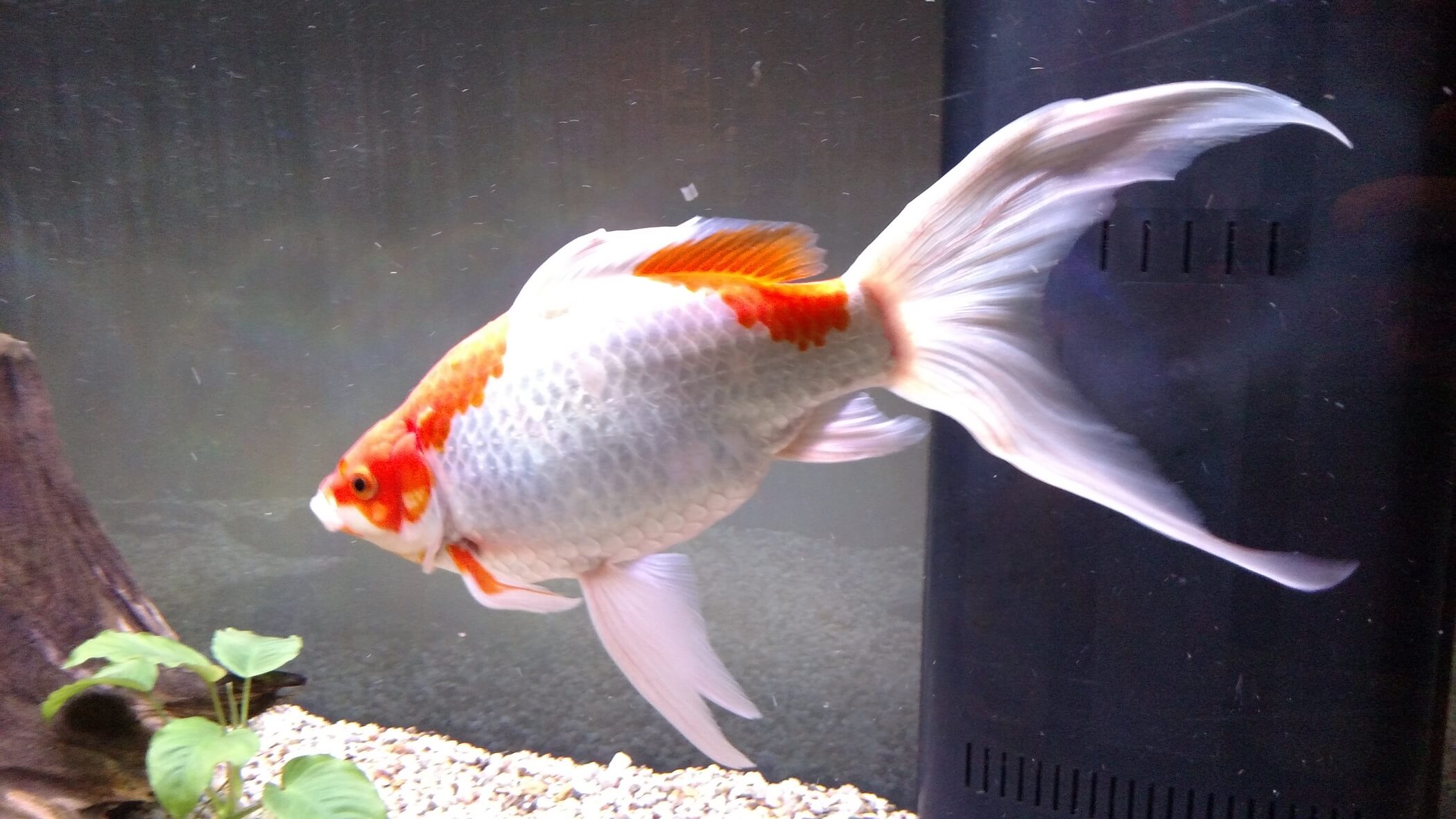Digestive Disorders in Goldfish and Koi
Digestive Disorders issues are common in goldfish, and most of these issues are caused from improper feeding, but once in a while, genetics plays a role. If your fish exhibit any of the symptoms above, a slow moving or even an impacted intestinal tract could be the culprit. In the wild, goldfish would spend most of the day in search of food; constant grazers. The food most in abundance is vegetation
Other food sources goldfish eat in the wild are small fish, fish eggs, worms and bugs which are difficult to find, the competition for food being fierce. Because of these feeding habits, they’ve evolved without having real stomachs. Eating too much food too quickly can cause a slow moving or impacted tract
Offer your fish a similar diet as they would eat in the wild. Feed less more often. Feed more vegetables and fewer flakes or pellets. Never feed floating pellets, and make sure food is pre moistened and held below the surface before being released so it sinks. Spread food in a sweeping motion so the food will be harder to find, which will keep them from overeating
-
Constipation in goldfish?
The biggest mistake goldfish keepers make is feeding too much, too infrequently. This leads to gorging; which can lead to gastric issues, constipation and blockage. Unfortunately, the goldfish just doesn’t know when to stop. Another mistake even the best of goldfish keepers make; is holding back food. Some experts believe withholding food relieves constipation, but it doesn’t. Either feeding method causes serious gastric issues that could interfere with the function of the swim bladder; the two being connected
Digestive disorders in goldfish
Just as the water in your tank or pond needs to be kept moving to discourage bad bacteria from forming, the same holds true with food moving through the intestinal tract. Slow moving food, or food that becomes impacted provides the perfect breeding ground for harmful bacteria; infecting the fish. If it goes unchecked, the bad bugs can spread throughout the body rapidly. Plants and vegetables are roughage which helps food and waste move through the tract. Flakes and pellets are considered as refined foods; slowing the movement
Because goldfish are cold blooded, meaning they have no core body temperature, their body function slows as the temperature lowers. Feeding goldfish in cold water could lead to digestive issues. Dormancy begins at 64f. When treating goldfish with digestive disorders, raise the temperature to the high side of the comfort zone for increased body function. Many digestive issues are created because the fish are overfed in cold water
No matter how hard it tries, this fish cannot stay on the bottom to feed. As soon as it stops swimming, it rises uncontrollably
Comfort zone for water temperature is 64f to 74f
Every goldfish diet should include peas. Peas are high in nutritional value, high in roughage, and goldfish love them
If your tank has some algae, this provides a healthy food source rich in roughage. Unfortunately, a lot of goldfish keepers don’t like the look of algae, or they don’t know what it is. Algae feeds on nitrates, keeping levels at bay. Algae is mother nature’s way of icing the cake to the nitrogen cycle
Having no stomach, goldfish digest their food quickly; within two to three hours after eating. Increased amounts of roughage increase the speed of digestion making for a healthy tract
Because the swim bladder organ is attached to the intestines, a slow tract blocks the gas exchange between the two, which keeps the fish from being able to rise at will
Float Remedy clears the tract, eliminating constipation
Warm solution in a cup of luke warm water before administering
Scoop the fish and some tank water up in a separate container; gently catch up the fish in cupped hands; lift its head above the surface. After a moment it will gasp, giving you a chance to administer
Gently push the tip deep in the throat, past the gills
The fish will spit, and the container water will become contaminated, so hand carry the fish back home. Repeat two to three times a day until the fish has gained control of swimming; meaning the tract has cleared
Digestive disorders in goldfish
Treating floating issues
After your fish has improved, include shelled and micro waved (frozen) peas until they very soft. Squeeze the pea; if it doesn’t mush easily, it’s too hard. Dry the peas on a paper towel, and marinate in garlic water. Feed a few times a week as a preventative. Feed nothing but peas marinated in one tablespoon of our Garlic Remedy for 10 days to eliminate infection
If bad bacteria comes into contact with good bacteria; they die instantly. Good bacteria takes approximately 10 to 12 hours to reproduce while bad bacteria can split in 20 to 30 minutes. Your fish will benefit from probiotics added to their diet
Digestive disorders in goldfish
Gel food is easily digested, and makes for a fast moving tract. Adding gel food to your fish’s diet will assure its tract is moving normally, and the good news is; most fish love gel food. Experiment with a recipe you think your fish will love. Feeding gel food gives us the opportunity to add nutrients and probiotics
Feed your fish a variety, and feed less more frequently. Hold food below the surface; moisten and slowly release
Do not feed your fish at the surface. This encourages swallowing air which can lead to serious gastric issues. Goldfish take in water through their mouths and expel it out their gills. During this process oxygen is absorbed from the water. If you have an air pump or bubbler in your set up; remove it. Some fish are attracted to the air bubbles and nip at them, but similar issues can result from the behavior
Step 10: Goldfish Feeding
All rights reserved
Author: Brenda Rand
